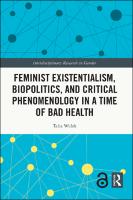Feminist Existentialism, Biopolitics, and Critical Phenomenology in a Time of Bad Health
Proposal review
| dc.contributor.author | Welsh, Talia | |
| dc.date.accessioned | 2021-10-25T07:39:52Z | |
| dc.date.available | 2021-10-25T07:39:52Z | |
| dc.date.issued | 2022 | |
| dc.identifier | ONIX_20211025_9781000480610_12 | |
| dc.identifier | ONIX_20211025_9781000480610_12 | |
| dc.identifier | OCN: 1257313420 | |
| dc.identifier.uri | https://library.oapen.org/handle/20.500.12657/51161 | |
| dc.description.abstract | This book explores the personal value of healthy behavior, arguing that our modern tendency to praise or blame individuals for their health is politically and economically motivated and has reinforced growing health disparities between the wealthy and poor under the guise of individual responsibility. We are awash in concerns about the state of our health and recommendations about how to improve it from medical professionals, public health experts, and the diet-exercise-wellness industry. The idea that health is about wellness and not just preventing illness becomes increasingly widespread as we find out how various modifiable behaviors, such as smoking or our diets, impact our health. In a critical examination of health, we find that alongside the move toward wellness as a state that the individual is responsible to in part produce, there is a roll-back of public programs. This book explores how this "good health imperative" is not as apolitical as one might assume. The more the individual is the locus of health, the less structural and historical issues that create health disparities are considered. Feminist Existentialism, Biopolitics, and Critical Phenomenology in a Time of Bad Health’s charts the impact of the increasing shift to a model of individual responsibility for one’s health. It will benefit readers who are interested to think critically about normalization to produce "healthy bodies." In addition, this book will benefit readers who understand the value of personal health, but are wary of the ways in which health can be used as a tool to discriminate and fuel inequalities in health care access. This volume is primarily of interest to academics, students, public health and medical professionals, and readers who are interested in critically examining health from philosophical perspective in order to understand how we can celebrate the value of healthy behavior without reinforcing discrimination. | |
| dc.language | English | |
| dc.relation.ispartofseries | Interdisciplinary Research in Gender | |
| dc.subject.classification | thema EDItEUR::J Society and Social Sciences::JB Society and culture: general::JBS Social groups, communities and identities::JBSF Gender studies, gender groups | en_US |
| dc.subject.other | Gender studies, gender groups | |
| dc.title | Feminist Existentialism, Biopolitics, and Critical Phenomenology in a Time of Bad Health | |
| dc.type | book | |
| oapen.identifier.doi | 10.4324/9781003168676 | |
| oapen.relation.isPublishedBy | 7b3c7b10-5b1e-40b3-860e-c6dd5197f0bb | |
| oapen.relation.isFundedBy | b818ba9d-2dd9-4fd7-a364-7f305aef7ee9 | |
| oapen.relation.isbn | 9781000480610 | |
| oapen.relation.isbn | 9781003168676 | |
| oapen.relation.isbn | 9780367768201 | |
| oapen.relation.isbn | 9780367768188 | |
| oapen.collection | Knowledge Unlatched (KU) | |
| oapen.imprint | Routledge | |
| oapen.pages | 200 | |
| peerreview.anonymity | Single-anonymised | |
| peerreview.id | bc80075c-96cc-4740-a9f3-a234bc2598f1 | |
| peerreview.open.review | No | |
| peerreview.publish.responsibility | Publisher | |
| peerreview.review.stage | Pre-publication | |
| peerreview.review.type | Proposal | |
| peerreview.reviewer.type | Internal editor | |
| peerreview.reviewer.type | External peer reviewer | |
| peerreview.title | Proposal review | |
| oapen.review.comments | Taylor & Francis open access titles are reviewed as a minimum at proposal stage by at least two external peer reviewers and an internal editor (additional reviews may be sought and additional content reviewed as required). |

